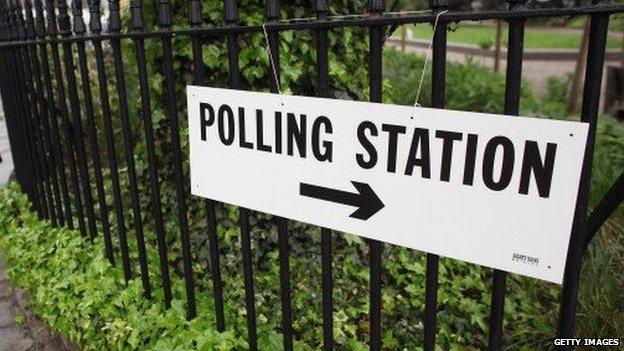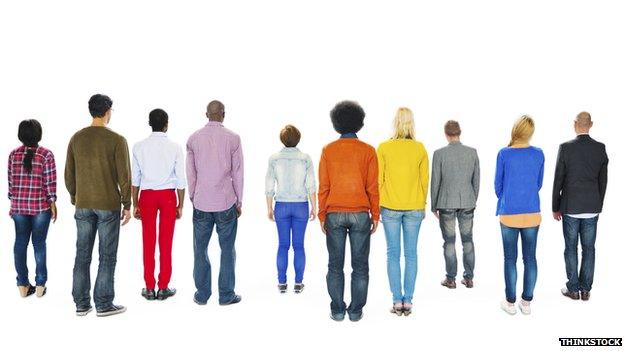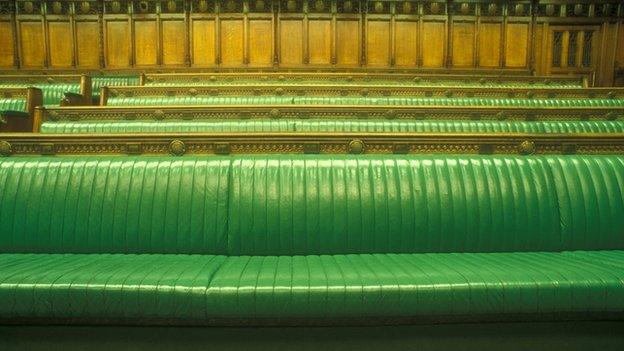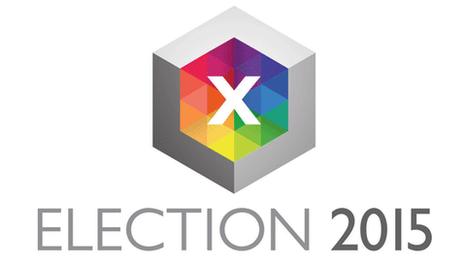Election 2015: General election FAQs
- Published
The general election is taking place on Thursday 7 May. Some key questions about how an election works are answered below.
Questions about voting

When will the vote happen?
The election takes place on 7 May, between 07:00 and 22:00 BST.
What are we voting for?
The general election will decide which party (or coalition of parties) forms the next UK government. There will be 650 seats in the UK Parliament's House of Commons up for grabs.
Who can vote?
You must be registered to vote, be at least 18 years old on polling day, be British or be a Commonwealth or Republic of Ireland citizen living in the UK.
Who is banned from voting?
The following are barred from voting in general elections: members of the House of Lords; EU citizens resident in the UK; anyone other than British, Irish and qualifying Commonwealth citizens; convicted prisoners; anybody found guilty of electoral fraud within the last five years; people who are subject to any "legal incapacity" which impairs their judgement.
How do I register to vote?
The deadline to register to vote in the upcoming general election is 20 April. You can register by post and, if you live in England, Scotland and Wales, online at www.gov.uk/register-to-vote, external. If you live in Northern Ireland, you will need to register using a different form. You can check whether you are on the electoral roll by contacting the electoral services department at your local council. Their contact details are listed on the Electoral Commission's special website, external.
Can I vote by post?
Yes. You can request a postal vote from the electoral services department at your local council - whom you should also contact if your polling card fails to arrive. The closing date for registering for a postal vote is Tuesday 21 April.
If you apply for a postal vote and then decide you would like to vote in person after all, it is still possible to do so. On election day you can take your postal vote to the polling station before the poll closes at 22:00. You will need to take the whole of your postal voting package with you. Alternatively you can deliver your postal vote to the returning officer at your local council (before they close), if you do not want to post it or it is too late to post it.
Arrangements for postal voting in Northern Ireland, external differ slightly.
What about proxy votes?
You can only apply for a long-term proxy vote if you have a specific reason such as a disability or being overseas. To vote by proxy - which means nominating someone to cast a vote for you - for just one election, you must have a reason such as being on holiday or away due to work. Your proxy must be aged 18 or over and registered individually. Furthermore, they cannot act as a proxy for more than two people at any one election or referendum, unless they are a close relative. If you are suddenly incapacitated or taken ill, you can apply to vote by proxy for medical reasons up until 5pm on polling day.
Northern Ireland has its own arrangements for proxy voting, external.
If I live abroad, can I vote?
Yes. You can register as an overseas voter if you are a British citizen and have been on a UK electoral register at any time within the past 15 years. To do so, you must be registered in the local authority area where you wish to vote. The deadline for registration is 20 April.
What about disabled voters?
Local authorities must take steps to ensure that polling stations do not disadvantage disabled people. To help blind and partially sighted voters, there has to be a "tactile device" in each polling station and there are rules on the size of print on ballot papers. The vast majority of poling stations are now more accessible for wheelchair users - but if a voter is unable to enter the polling station because of physical disability, the polling officer may take the ballot paper to them. Proxy ballots are allowed for those unable to vote because of disability, or the help of the presiding officer may be requested. A doctor's note is required if the person with disabilities is applying for an indefinite proxy vote. If you have any problems on election day, you should call your local authority to try to resolve this.
What about illiterate voters?
There is no literacy qualification for voting: anyone who is illiterate can ask the polling officer at the polling station to mark their ballot, or take a companion to help them.
What is on the ballot paper?
You will be given an officially marked ballot paper listing all the candidates in alphabetical order of surname, with the description of their party, if they have one. You place an X in the box beside your one chosen candidate.
Is it compulsory to vote?
No, people cannot be forced to vote, nor is registration itself compulsory.
Is my vote secret?
The ballot papers contains a serial number: it is possible, but illegal, to trace all the votes to the people who cast them. The number is there to stop electoral fraud.
Can the Queen vote?
Yes, but in practice it is considered unconstitutional for the monarch to vote in an election.

Questions about standing

How can I become a candidate?
To be a candidate, you need to have a nomination form signed by 10 voters from that constituency. The papers must be returned by 9 April to a place decided by the local acting returning officer, along with £500 deposit. Candidates do not need to be a member of a political party. The main parties have their own selection methods, usually involving central lists of candidates and votes of local members.
Who can stand as a candidate?
Candidates must be aged 18 or above and be British, Commonwealth or Republic of Ireland citizens. Those banned from standing in general elections are: civil servants; police officers; armed forces personnel; some bankrupts; government-nominated directors of commercial companies; judges; members of parliament in non-Commonwealth nations; those convicted of electoral malpractice; members of the House of Lords.
How can I set up a political party?
All political parties have to be registered with the Electoral Commission, a process which costs £150. The commission will need the names of three party officials and details of the party's financial arrangements and constitution. It can refuse to register a party if its name is confusingly similar to another party's or if the name is offensive in some way. You do not have to be a member of party though - you can stand under your own name as an independent candidate.
How much can candidates spend?
There are strict limits on what can be spent once nominations close, and candidates are required by the elections watchdog to keep a record of all expenses. Candidates in rural (county council) areas can spend up to £8,700 plus 9p per elector. Those standing in urban (borough council) areas can spend up to £8,700 plus 6p per voter.
How much can parties spend?
Registered parties are restricted in their spending for the 365 days before the election. Parties can spend up to £30,000 for each seat they contest - which adds up to £19.5m if they fight every constituency.
Is there anything to prevent third parties spending extra money backing political parties' campaigns?
Yes, people or groups campaigning on behalf of one or more political parties or candidates who advocate a particular policy, face limits too. If they intend to spend more than £20,000 in England, or £10,000 in Scotland, Wales or Northern Ireland campaigning at the UK general election, they must register with the elections watchdog as a "non-party campaigner".
Where does the money come from?
Political parties and candidates raise funds in a variety of ways from subscriptions to local fetes and dinners. There are strict rules on donations: those of more than £500 to a party or £50 to a candidate have to be from permissible donors - effectively banning overseas gifts. All donations of more than £7,500 to a party, or £1,500 to a local branch, have to be publicly declared.

Questions about the system

Who organises the election?
The top civil servant of the local council is the returning officer for each constituency, with the day-to-day running of the poll left to the head of the council's electoral services department.
How much does it cost to run an election?
The last UK general election, in 2010, cost £84.6m to administer (excluding the cost of postal delivery).
Why are elections held on Thursdays?
It has been a convention rather than a legal requirement, although the Fixed-term Parliaments Act now provides for general elections to be held on the first Thursday in May every five years. One theory about the Thursday origins is that people were not paid until Fridays and so holding polls on Thursdays ensured they were not too drunk to vote. The Electoral Commission has suggested advance voting as a way of improving turnout, to allow people to vote between one and seven days before the close of the poll.
How does the voting system work?
The UK uses a first-past-the-post system. To become an MP, a candidate simply has to win more votes than any rival in their constituency, not a majority of votes cast.
How can I find out what a candidate or party believes?
Each party should publish an election manifesto which is available from them or can be bought in the shops. Candidates will campaign locally and are entitled to one free mailing of an election leaflet to voters in their constituency.
How many MPs does each party have?
As Parliament was dissolved ahead of the election, the Conservatives had 302 MPs. Labour had 256, the Lib Dems 56 and the Democratic Unionist Party eight. The Scottish National Party had six MPs, Sinn Fein five, Plaid Cymru three, the Social Democratic and Labour Party three and UKIP two. Respect, the Alliance Party and the Greens had one apiece. Five MPs were independents. The Speaker, who does not take part in Commons votes, is another one.
How does a party leader become PM?
The day after a general election, if any party wins a majority - more than 50% - of Commons seats, the Queen invites its leader to become prime minister and to form the government. If he or she says yes, they become prime minister immediately. Their predecessor then moves out of Downing Street.
What happens if the prime minister loses his seat?
The prime minister's party would offer up a candidate to take over temporarily as a caretaker leader/prime minister. The Queen would then call the potential prime minister to Buckingham Palace to ask them whether they would form a government. The governing party would then hold a leadership election.
What if no party wins a Commons majority?
The situation becomes more complex if no party has a majority of MPs. The largest single party could try to form a minority government, but this would involve difficulties with getting business done and could prove unworkable. It, or other parties, could try to form a coalition, with the result that their combined MPs provide a Commons majority. Or it could reach an informal agreement with another party not to vote against it when a "no-confidence" motion is tabled by the opposition, enabling it to become a sustainable government.

BBC coverage

What rules does the BBC follow?
Every part of the BBC has to follow election guidelines, external - which supplement the BBC's overarching editorial guidelines - set down by the corporation's governors. They include advice on the "appropriate" level of coverage to give the main parties and how to reflect the smaller ones.
How will the BBC cover the election?
The BBC will be covering the election across TV, radio and online.
How does the poll tracker work?
The poll tracker guide to the opinion polls has its own how it works page.